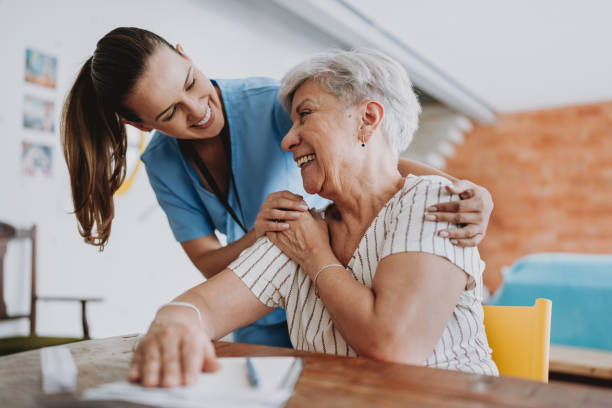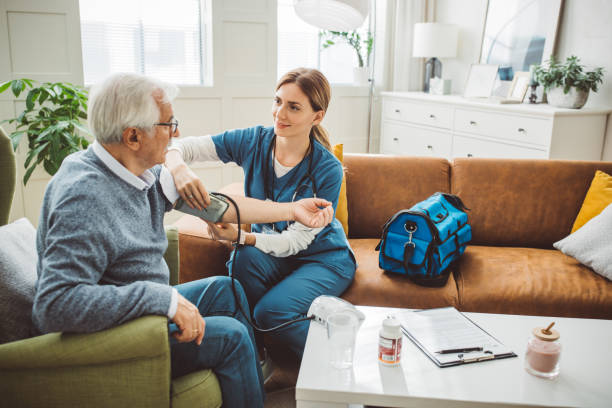Falls are one of the most common causes of injury among seniors, often leading to fractures, hospitalizations, and a decline in overall quality of life. For older adults, maintaining mobility and independence while minimizing risks is crucial. Home health care has emerged as a valuable solution to reduce the risk of falls, providing a safe and supportive environment tailored to each senior’s unique needs. This article explores how home health care contributes to fall prevention and enhances the well-being of seniors.
Contents
- 1 Understanding the Impact of Falls on Seniors
- 2 Comprehensive Assessment of Fall Risks
- 3 Personalized Exercise and Rehabilitation Plans
- 4 Assistance with Daily Activities
- 5 Home Modifications for Safety
- 6 Education and Awareness
- 7 Emotional and Psychological Benefits
- 8 A Collaborative Approach to Fall Prevention
- 9 Wrapping Up
Understanding the Impact of Falls on Seniors
Falls are a significant health concern for older adults. According to the Centers for Disease Control and Prevention (CDC), one in four Americans aged 65 and older falls every year. These incidents often lead to severe consequences such as hip fractures, head injuries, and chronic pain. Beyond the physical injuries, falls can result in psychological impacts, including fear of falling again, which may cause seniors to limit their activities and lose strength over time.
Preventing falls is a top priority in senior care, and home healthcare services are critical in addressing the various risk factors associated with falls.
Comprehensive Assessment of Fall Risks
Home health care begins with a comprehensive assessment of the senior’s living environment and physical condition. Professionals, including nurses and therapists, evaluate various risk factors such as:
- Environmental Hazards: Cluttered spaces, loose rugs, poor lighting, and uneven flooring can increase fall risks. Home health care teams identify these hazards and suggest modifications to create a safer environment.
- Physical and Cognitive Health: Conditions such as muscle weakness, balance issues, impaired vision, and cognitive decline significantly increase fall risks. A thorough health assessment helps devise strategies to address these issues.
- Medication Management: Many seniors take multiple medications, some of which may cause dizziness or drowsiness. Home health care professionals ensure proper medication management to reduce side effects that could lead to falls.
Home healthcare professionals provide a solid foundation for fall prevention by identifying and addressing these risk factors.
Personalized Exercise and Rehabilitation Plans
Strength, balance, and flexibility play a vital role in preventing falls. Home health care often includes physical therapy and exercise programs tailored to seniors’ needs. These programs aim to improve mobility and reduce fall risks through:
- Strengthening Exercises: Focused on improving core and lower body strength, these exercises help seniors maintain stability.
- Balance Training: Activities like tai chi and yoga enhance coordination and balance, reducing the likelihood of falls.
- Rehabilitation Support: Home health care professionals provide rehabilitation services for seniors recovering from injuries or surgeries to regain strength and confidence in their mobility.
Personalized exercise routines also help promote overall physical health, empowering seniors to stay active and independent.
Assistance with Daily Activities

Many falls occur during routine activities such as bathing, dressing, or cooking. Home health care professionals offer assistance with these daily tasks, ensuring safety and reducing the risk of accidents. Key services include:
- Mobility Support: Caregivers help seniors navigate their homes, providing support with walking aids and ensuring proper usage.
- Supervision and Monitoring: Having a trained professional present minimizes the risk of falls, especially for seniors with mobility challenges or cognitive impairments.
- Emergency Preparedness: Home health care teams ensure that seniors have access to emergency alert systems, giving both seniors and their families peace of mind.
By supporting seniors in their daily routines, home health care significantly decreases the likelihood of falls in the home setting.
Home Modifications for Safety
A safe living environment is crucial in preventing falls. Home health care services often include recommendations for home modifications, such as:
- Grab Bars and Handrails: Installing these in bathrooms, stairways, and other critical areas provides additional support.
- Non-Slip Flooring: Replacing loose rugs or slippery surfaces with non-slip materials reduces fall risks.
- Improved Lighting: Adequate lighting in hallways, staircases, and entryways minimizes tripping hazards.
These modifications make the home a safer place for seniors and help them maintain independence.
Education and Awareness
One of the key aspects of home health care is educating seniors and their families about fall prevention. Caregivers provide guidance on:
- Recognizing and avoiding potential hazards.
- Using mobility aids correctly.
- Adopting lifestyle changes to reduce risks, such as regular exercise and proper hydration.
This education empowers seniors to take proactive steps in managing their safety and encourages family members to support their loved ones effectively.
Emotional and Psychological Benefits
In addition to physical safety, home health care offers emotional and psychological benefits. Seniors often feel more secure and confident knowing they are in a safe environment with professional support. This peace of mind reduces anxiety and helps prevent the fear of falling from interfering with their daily lives.
A Collaborative Approach to Fall Prevention
Home health care involves collaboration between seniors, their families, and healthcare professionals. This approach provides comprehensive fall prevention by addressing physical, environmental, and emotional factors. Families are also encouraged to stay engaged in their loved one’s care, ensuring a supportive network that promotes long-term safety and well-being.
Wrapping Up
Falls are a serious concern for seniors, but they are not inevitable. With the right support, seniors can maintain their independence and significantly reduce their risk of falling. Home health care plays a vital role in this effort, offering personalized care, assistance with daily activities, home modifications, and education. Families can ensure their loved ones stay safe, healthy, and confident in their golden years by investing in home health care.

